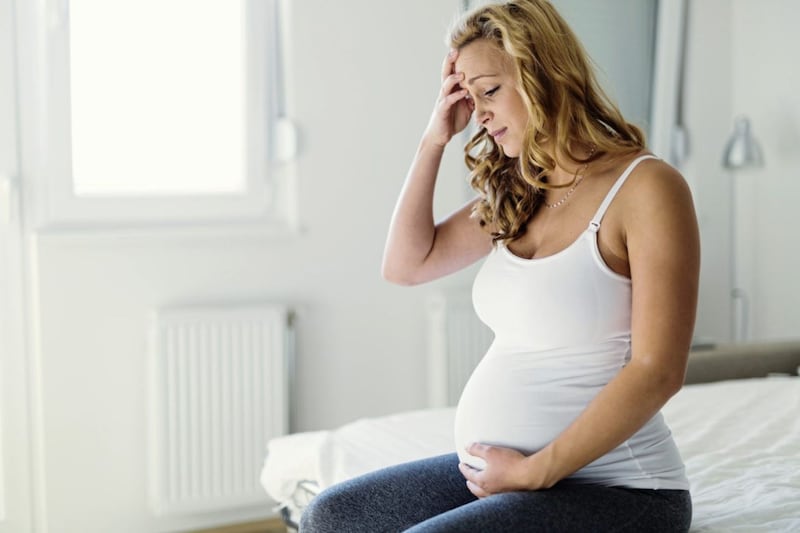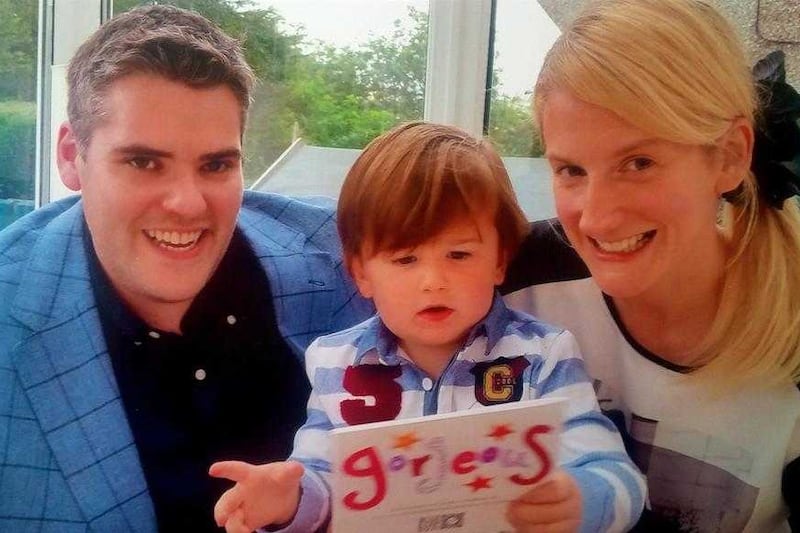TWELVE months ago I wouldn’t have been able to speak with Lindsay Robinson. She couldn’t face talking, she couldn’t have articulated, she didn’t want to go out of the door to see anybody.
She went on holiday to Italy with her husband Gavin only to sit in the hotel room and cry. She was experiencing a mental illness but she didn’t know why nor what was causing it.
“It wasn’t a case of relaxing in the sun because there’s no quick fix for depression. It’s not until you experience mental illness that you realise what it’s like and in Italy I began to suspect how ill I was,” she says now.
A few years earlier, just as Gavin Robinson was elected lord mayor of Belfast Lindsay realised she was pregnant. There were many civic events to attend and, as she says, being a young couple expecting their first baby was a great attraction to both the public and the press – but it meant extra stress and pressure.
“One of the big issues was that Reuben was very small baby. I didn’t have a bump and I faced a lot of comment that I didn’t look pregnant,. ‘Are you sure you’re having a baby?' Or ‘Lindsay is there something wrong?’
"It got to the point where I hated having my photograph taken and dreaded interviews. Looking back, I know nobody meant any harm but words are really powerful. I certainly took a lot of those things to heart because, although we didn’t know it, I was already suffering depression. It wasn’t picked up so it developed into prenatal and then serious postnatal depression.”
Before Reuben was born Lindsay worked in full-time ministry and with the Scripture Union NI. Since she was 22 years of age her faith was always the centre of her life; it sustained her through many dark hours but postnatal depression changed all that.
There were concerns about the baby’s health; thankfully all was well except for one thing: when he was born Lindsay felt nothing.
“I found it incredibly hard to believe he was my baby. Who wouldn’t love a tiny healthy baby? But I couldn’t comprehend he belonged to me. I’d asked for help when the baby was six weeks old and when he was three months old but the medical professionals told me there was nothing wrong – just get on with it, they said.”
So she did. But for the next two years she found pleasure in nothing and all this time her faith was being tested, not for the first time. She’s had difficult situations to face in the past but there was always someone who understood and was supportive.
“In this case it was all internal. I felt like I couldn’t share it and if I did try I was told to it was just being a new mum. One of the biggest problems here in Northern Ireland is a failure to get a diagnosis and then get the help that’s needed, all because there’s not enough understanding of postnatal depression. That’s why I share my story.”
Late last year she cried out to God: “I need You. I have no idea what is wrong with me, I’m frightened but I choose to trust You. Please show me that way forward.” The way forward included reading blogs written by women talking about their experience of 'baby blues’.
“Something, unbelievably, clicked and I thought that’s very like my situation and the way I feel. I told the GP everything. He looked me in the eye and said: ‘Lindsay you have postnatal depression and we’re going to get you the help you need and you’re going to be OK.’”
Even as she speaks you can hear the relief and see the joy.
“Honestly, I could have kissed him. Someone understood, I had a diagnosis; I was so excited I jumped out of the chair. I had a promise that this awful situation may well end.”
It was the beginning of a new time for the couple and their son. With psychiatric help she has worked through her illness.
“I am now very clear Reuben is my baby; he is my son. Those years have given me an understanding of what other mothers go through. You feel lonely and no-one understands so it gets worse and worse. It’s absolutely awful and that’s why I’m so keen to help other mums who are suffering. Through my website and my blog I invite them to connect with me.
“Looking back, postnatal depression ripped to the heart of who I was and to my very soul. I paid the price in every area of my life, emotionally, mentally, physically and spiritually. Mental illness was my condition and I know there’s a stigma around the words yet we all have mental health just as we have physical health so we just need to learn to look after it.
"The statistics are that at least one in four of us will struggle with mental health issues; therefore it’s important to realise that it’s the silence that breeds the stigma. Don’t be afraid to talk or afraid to share.”
The Robinsons are a family of three and Reuben is a healthy three-year-old. Gavin, MP for Belfast East, spends Monday to Thursday at Westminster; Reuben Skypes him every day and he can’t wait to see his daddy coming home. And Lindsay is happier than she has been for many years and her faith is restored.
“I believe very firmly that God uses all things to heal. He healed me using a great GP, the therapy and family support. He also healed me with his love; in fact, He orchestrated everything.”
:: Lindsay is the maternal mental health ambassador for Niamh, the Northern Ireland Association for Mental Health. She is also part of the Maternal Mental Health Alliance which runs the #everyonesbusiness campaign.
More at www.haveyouseenthatgirl.com





